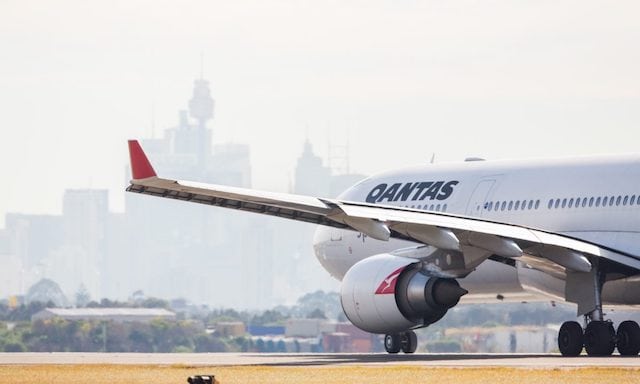
Qantas Airways Airbus A330-200. Photo courtesy of Qantas
Qantas Airways CEO Alan Joyce issued a challenge to Airbus and Boeing during the Australian carrier’s 2017 earnings call — build a commercial airplane capable of flying from Melbourne to New York nonstop with a full payload. The chief executive’s challenge came following a year in which Qantas reported its second-highest underlying profit in its history ($1.4 billion) for its 2017 financial year.
“I’m pleased to announce that Qantas will challenge Boeing and Airbus to deliver an aircraft capable of flying regular direct services like Sydney-London, Brisbane-Paris and Melbourne-New York nonstop with a full payload by 2022,” said Joyce.
Joyce, who has written letters to Boeing CEO Dennis Muilenburg and Airbus CEO Fabrice Bregier issuing the challenge, said the two OEMs are currently building airplanes that “can almost do the job.”
According to data provided by Jeppesen, the distances between the specific destinations Qantas is looking to fly to are as follows:
Brisbane (YBBB) to Paris (LFPG) = 8,922 Nautical Miles.
Melbourne (YMML) to New York (KJFK) = 9,009 Nautical Miles.
Sydney (YSSY) to London (EGLL) = 9,184 Nautical Miles.
(Note: Distances produced using Great Circle calculations, if airways are used between the locations, they would vary, according to Jeppesen.)
Boeing’s current technical specifications for the two currently planned variants of the 777X would not meet Joyce’s request, though. The 777-8 seats up to 375 passengers and would have a range of 8,700 nautical miles, while the 777-9 variant seats up to 425 passengers and would have a range of 7,600 nautical miles. Both aircraft are powered by GE9X engines and will be Boeing’s first commercial airliner to feature touchscreen displays in the cockpit.
The latest published information from Airbus about the ultra long range version of the A350-900ULR notes that it will enable “service on non-stop flights of up to 19 hours.”
Upon publishing its 2017 financial results, Qantas noted that it is “investigating direct flights from the east coast of Australia to London and New York by 2022.” The airline says direct flights between Sydney to London would cut the total journey time of its current Sydney to London routes, which feature connections, by up to four hours. Direct flights between Melbourne and New York would reduce flying time on that route by almost three hours, according to Qantas.
Qantas already has plans for a 17-hour nonstop flight between Perth and London on a Boeing 787-9 beginning March 2018.
“We believe advances in the next few years will close the gap, and Qantas has the unique operational experience to be the airline that helps make it happen,” said Joyce.
Qantas wants to aid both Airbus and Boeing in designing aircraft capable of meeting its 2022 distance targets. Joyce said work is already underway to achieve this under an initiative called “Project Sunrise.” The title of the initiative is a reference to the double sunrise flights that Qantas operated across the Indian Ocean during World War II. Those flights remained airborne long enough to witness two sunrises.
Outside of the longer range aircraft Qantas is seeking, the airline will add eight new Boeing 787 Dreamliners by 2019, which will serve as replacements for five older jumbo jets. Qantas will continue flying its extended-range 747s into the early 2020s.
Additionally, Qantas is currently trialing Wi-Fi on its domestic A330s and 737s, and expects to complete the trial and obtain regulatory approval for the new Wi-Fi service in late September.